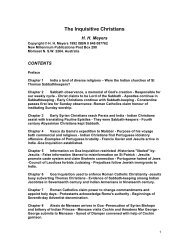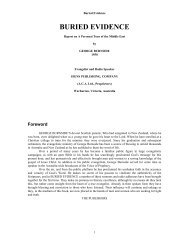Battle of the Bibles - Present Truth
Battle of the Bibles - Present Truth
Battle of the Bibles - Present Truth
You also want an ePaper? Increase the reach of your titles
YUMPU automatically turns print PDFs into web optimized ePapers that Google loves.
The following year an editorial in The Protestant Magazine astutely observed:<br />
"The Protestant reformation <strong>of</strong> <strong>the</strong> sixteenth century was an organised movement<br />
to set aside <strong>the</strong> authority <strong>of</strong> <strong>the</strong> popes, councils and tradition, and to return to <strong>the</strong><br />
unadulterated teaching <strong>of</strong> Holy Scripture. The present partial failure <strong>of</strong> Protestantism is<br />
due to <strong>the</strong> repudiation <strong>of</strong> this fundamental feature <strong>of</strong> that movement" (ibid p 293).<br />
Fortunately, by <strong>the</strong> 'seventies, Adventists were still taking such Protestant<br />
warnings seriously. Maxwell's advice was largely ignored as Seventh-day Adventist<br />
congregations clung tenaciously to <strong>the</strong>ir beloved King James Version.<br />
Chapter Twenty-Six<br />
Rome's Little Helper<br />
It is historically demonstrable that denominational apostasy usually comes from<br />
<strong>the</strong> top. It is <strong>the</strong> result <strong>of</strong> organisational heresy which filters through its employees to <strong>the</strong><br />
church congregations. Fur<strong>the</strong>rmore, it is a fact that such changes come slowly, for time<br />
and funerals are an integral part <strong>of</strong> <strong>the</strong> process.<br />
It should never be forgotten that <strong>the</strong> term "apostasy" means a turning away from<br />
a position previously espoused. Therefore, when we speak <strong>of</strong> "Apostate Protestantism",<br />
we are referring to churches that have turned <strong>the</strong>ir back on <strong>the</strong> Reformation and have, or<br />
are going back to <strong>the</strong> "Mo<strong>the</strong>r Church" - Rome.<br />
The Seventh-day Adventist Church has used this term ever since its inception to<br />
describe <strong>the</strong> decline in Protestantism generally. Few realised that by <strong>the</strong> mid-twentieth<br />
century <strong>the</strong> process was well under way within <strong>the</strong>ir own denomination!<br />
A few people had pondered <strong>the</strong> increasing efforts to replace <strong>the</strong> King James<br />
Bible with <strong>the</strong> National Council <strong>of</strong> Churches Revised Standard Version. Its failure to be<br />
accepted by Adventist congregations defused any serious attempt to probe <strong>the</strong> real<br />
purpose behind <strong>the</strong> introduction <strong>of</strong> those modern versions, which <strong>of</strong> course was an<br />
attempt to provide Biblical support for a developing conspiracy to lead "The Truly<br />
Protestant Church" back into <strong>the</strong> arms <strong>of</strong> Rome. 21<br />
21 Said L.E. Froom, Secretary <strong>of</strong> <strong>the</strong> general Conference Ministerial Association,<br />
in <strong>the</strong> <strong>of</strong>ficial SDA Church magazine, Review and Herald: "We see that <strong>the</strong> Seventh-day<br />
Adventists are truly Protestant, in taking <strong>the</strong> prophecies <strong>of</strong> <strong>the</strong> Bible from '<strong>the</strong> Bible and<br />
<strong>the</strong> Bible only"' (Sept 23, 1948, p 10). Fur<strong>the</strong>r evidence <strong>of</strong> Adventists genuine protest<br />
against Roman Catholicism is <strong>the</strong>ir refusal to worship on <strong>the</strong> day set apart by Rome -<br />
"<strong>the</strong> venerable day <strong>of</strong> <strong>the</strong> Sun".<br />
Ever since <strong>the</strong>ir fledgling church had published its views on "The Great<br />
Controversy Between Christ and Satan", back in 1887, Seventh-day Adventism had<br />
gained <strong>the</strong> particular attention <strong>of</strong> <strong>the</strong> Papacy. The book itself was proscribed. (22<br />
Proscribe - to denounce and condemn as dangerous, to prohibit.) No wonder! Its author,<br />
Ellen G. White, a convert to Adventism from <strong>the</strong> Methodist Church, made it quite plain<br />
that Protestantism in America was imperilled by Roman Catholic action.<br />
In a chapter titled: "The Aims <strong>of</strong> <strong>the</strong> Papacy" she wrote: “Protestants have<br />
tampered with and patronised popery; <strong>the</strong>y have made compromises and concessions<br />
which papists <strong>the</strong>mselves are surprised to see, and fail to understand. Men are closing<br />
<strong>the</strong>ir eyes to <strong>the</strong> real character <strong>of</strong> Romanism, and <strong>the</strong> dangers to be apprehended from<br />
her supremacy. The people need to be aroused to resist <strong>the</strong> advances <strong>of</strong> this most<br />
dangerous foe to civil and religious liberty" (P 566).<br />
7





